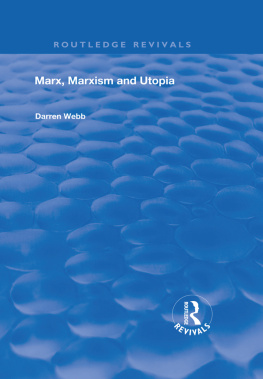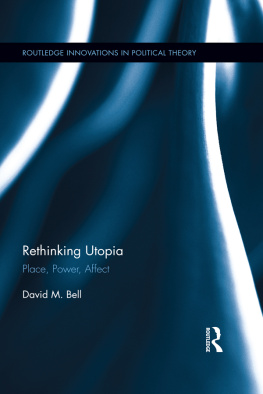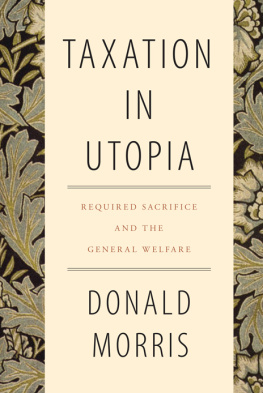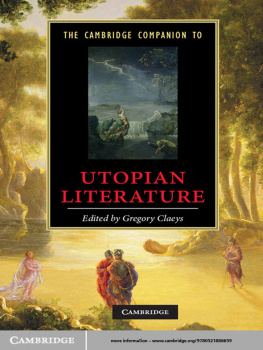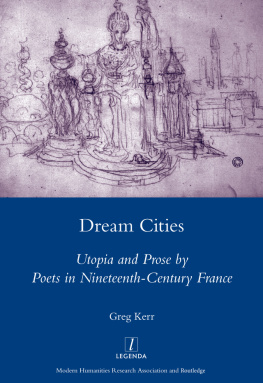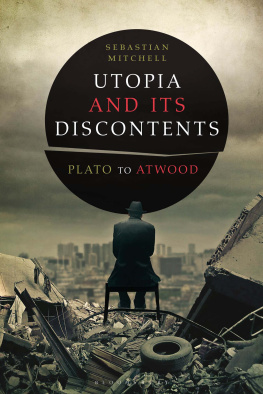The Amherst Series in Law, Jurisprudence, and Social Thought
EDITED BY
Austin Sarat, Lawrence Douglas, and Martha Merrill Umphrey
Law and the Utopian Imagination
Edited by
AUSTIN SARAT
LAWRENCE DOUGLAS
MARTHA MERRILL UMPHREY
STANFORD LAW BOOKS
An imprint of Stanford University Press
Stanford, California
Stanford University Press
Stanford, California
2014 by the Board of Trustees of the
Leland Stanford Junior University
No part of this book may be reproduced or transmitted in any form or by any means, electronic or mechanical, including photocopying and recording, or in any information storage or retrieval system without the prior written permission of Stanford University Press.
Library of Congress Cataloging-in-Publication Data
Law and the utopian imagination / edited by Austin Sarat, Lawrence Douglas, and Martha Merrill Umphrey.
pages cm.(The Amherst series in law, jurisprudence, and social thought)
Includes bibliographical references and index.
ISBN 978-0-8047-9081-9 (cloth : alk. paper)
1. LawPhilosophy. 2. Utopias. I. Sarat, Austin, editor of compilation. II. Douglas, Lawrence, editor of compilation. III. Umphrey, Martha Merrill, editor of compilation. IV. Series: Amherst series in law, jurisprudence, and social thought.
k486.l39 2014
340.1dc23
2013043600
ISBN 978-0-8047-9186-1 (electronic)
Printed in the United States of America on acid-free, archival-quality paper
Typeset at Stanford University Press in 10/14.5 Minion
For my son Ben,
with love and thanks for the joy he shares (AS)
For Jacob and Milo,
with hopes for a better world (LD)
Acknowledgments
We are grateful to our Amherst College colleagues David Delaney, Nasser Hussain, and Adam Sitze for their intellectual companionship. We thank our students in Amherst Colleges Department of Law, Jurisprudence and Social Thought for their interest in the issues addressed in this book. Finally, we would like to express our appreciation for generous financial support provided by Amherst Colleges Corliss Lamont Fund.
Contents
LAWRENCE DOUGLAS, AUSTIN SARAT, AND MARTHA MERRILL UMPHREY
JAMES R. MARTEL
JOHAN VAN DER WALT
NAN GOODMAN
DIANE MORGAN
SHULAMIT ALMOG
Contributors
SHULAMIT ALMOG is Professor of Law and Director of Doctoral Program of the Faculty of Law at the University of Haifa
LAWRENCE DOUGLAS is James J. Grosfeld Professor of Law, Jurisprudence and Social Thought at Amherst College
NAN GOODMAN is Professor of English at the University of Colorado at Boulder
JAMES MARTEL is Associate Professor of Political Science at San Francisco State University
DIANE MORGAN is a Lecturer in the School of Fine Art, History of Art, and Cultural Studies at the University of Leeds
AUSTIN SARAT is Associate Dean of the Faculty, the William Nelson Cromwell Professor of Jurisprudence and Political Science, and Professor of Law, Jurisprudence and Social Thought at Amherst College
JOHAN VAN DER WALT is Professor of Legal Philosophy, University of Luxembourg
MARTHA MERRILL UMPHREY is Professor of Law, Jurisprudence and Social Thought at Amherst College
Law and the Utopian Imagination: An Introduction
LAWRENCE DOUGLAS
AUSTIN SARAT
MARTHA MERRILL UMPHREY
In 1922, toward the conclusion of his first book, Story of Utopias, the American sociologist Lewis Mumford wrote, Our most important task at the present moment is to build castles in the sky. A scant two decades later, a very different tone sounded in the pages of three of the most influential social thinkers of the midcentury. Writing independently, Karl Popper, Lionel Trilling, and Isaiah Berlin essayed critiques of utopianism that, taken together, delivered a broad indictment of utopian thinking. Far from locating in the utopian imagination a vital force for human betterment and social progress, these midcentury thinkers powerfully argued that utopianism paves the way to totalitarianism and that its logical endpoint is not the peaceful community of equals but the death camp. In particular, these thinkers laid bare the particular antagonisms between utopianism and liberal legalityfinding in the former a dire threat to the salutary commitments of the latter.
Who, then, writes seriously on the idea of utopia today? The answer would seem to be: almost no one, and least of all scholars of the law. The midcentury critique appears to have carried the day, and a belief in the very possibility of utopian achievementsbracketing for a moment the question of their desirabilityappears to have flagged in the face of a world marked by political instability, social upheaval, and dreary market realities. True, one can find in the Still, it seems fair to say that utopianism finds itself in a generally moribund statediscredited by a series of critiques penned in the middle of the last century, and marginalized by the dislocations of current political and market processes.
This volume can be seen, then, as a project of exploration and resuscitation. Instead of mapping out the contours of a familiar terrain, our contributors seek to explore the possibilities of a productive engagement between the utopian and the legal imagination. Is it possible to reimagine or revitalize the concept of utopia such that it can survive the terms of the midcentury liberal critique? Alternatively, is it possible to reframe the concept of utopia and the theory of liberal legality so as to dissolve the apparent antagonism between the two? In charting possible answers to these questions, the present volume hopes to revive interest in a vital topic of inquiry too long neglected by both social thinkers and legal scholars.
...
The term utopia first appeared in Sir Thomas Mores eponymous novel of 1516, but the concept predated More by two millennia, finding its first and most influential elaboration in the pages of Platos Republic. Over the centuries the utopian imagination has produced a rich and varied literature, including such classics as Samuel Butlers Erewhon, Edward Bellamys Looking Backward, and B. F. Skinners Walden Two. Some of these works were no doubt meant to serve as criticism of existing social and political structures; to this day, scholars cannot agree on whether More intended utopiaLatin for no where, a place the reader is guided through by a character named Raphael Hythloday, or dispenser of nonsenseas a bona fide vision or an ironic critique of Elizabethan institutions. Yet whatever the answer to this question, there is no denying that countless real-world social experiments have been launched under the capacious rubric of utopianism.
Our purpose here is not to inventory such experiments; our concern is with the nature of the utopian imagination that has endorsed and stimulated such ventures. In imagining an ideal or perfect community, the utopian imagination has typically eschewed nostalgia. It finds its ideal not in a prelapsarian, Edenic state of innocence; instead, the utopian imagination has tended to fix its gaze on the future, finding its realization not in the dissolution of social arrangements and institutions but in their dialectical transcendence or radical improvement. Certainly one can find aspects of prelapsarian thinking in the utopian imaginationMores vision of the abolition of private property harks back to Plato, just as Plato locates one model of utopia in the lost island of Atlantisbut still the larger fact remains that utopias are not points of return: they are destinations that must be fashioned and engineered. In Mores novel, for example, Utopia is an island, but an artificial, not a natural one. Originally a peninsula, the island was created through an ambitious and arduous project of land removal, meant to insulate the community from threatsmilitary and otherwisefrom the mainland.
Next page

